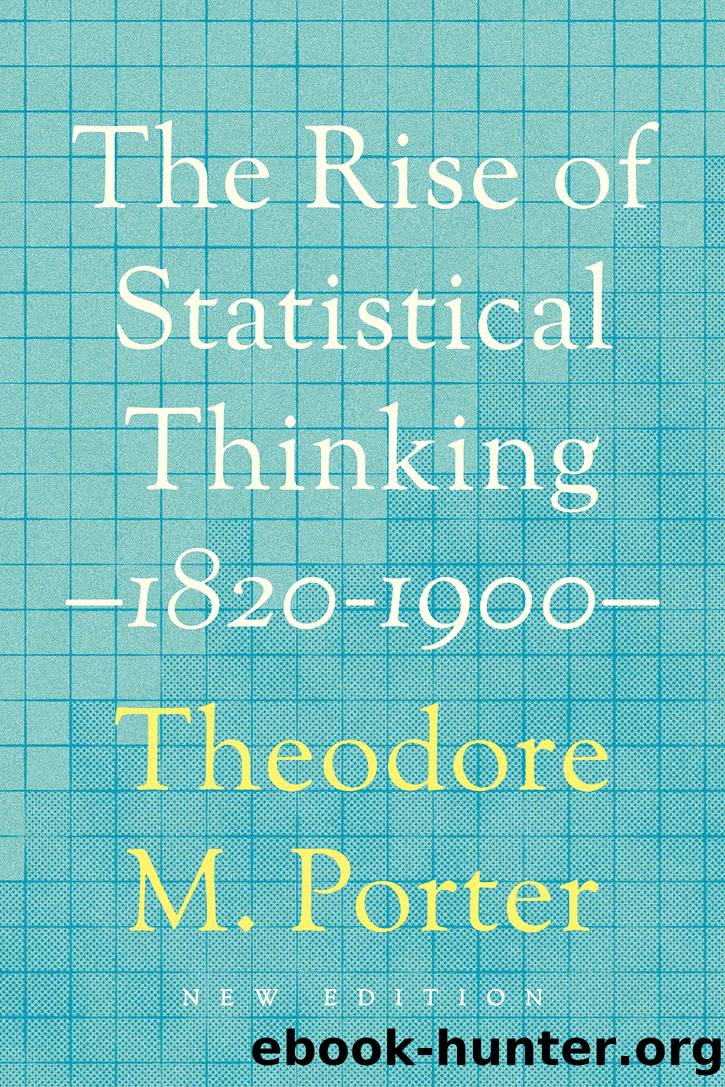The Rise of Statistical Thinking, 1820â1900 by Theodore M. Porter

Author:Theodore M. Porter [Porter, Theodore M.]
Language: eng
Format: epub
ISBN: 9780691208428
Publisher: PrincetonUP
Published: 2020-07-15T00:00:00+00:00
Buckleâs counterposition of free will and statistics was less controversial in France and Belgium, perhaps because his book attracted far less attention there. Queteletâs grand pronouncements on lâhomme moyen and physique sociale had also been received more coolly in France than in Great Britain. Quetelet himself was pleased at the publicity he received from Buckleâs book, and he quoted at length from the relevant chapter in his book Physique sociale of 1869. The statistical determinism did not offend him. When John Herschel complained to him of the discredit cast on statistics by Buckleâs unjustified remarks on free will, Quetelet responded placidly that his good friend had analyzed these ideas âtrop de rigueur.â50
By contrast, in Germany, where Quetelet had been little noticed except by specialists before 1860, Buckleâs book elevated both men to prominence and inspired a controversy over free will and statistics at least as vehement as that in Britain. Oddly enough, Buckle was translated by Arnold Ruge, the aging Young Hegelian, by then an exile in England, who had decided to make the translation and exposition of Buckle to his countrymen his life work. This implied no rejection of his former commitments, he explained; Buckleâs history captured the true spirit of Hegelian philosophy. Its author, he went on, should not be too harshly judged for his inability to comprehend the true concept of freedom, and it would be a mistake to speak âas if Buckle were a materialist, when he is really only an Englishman.â51 Buckleâs remarkable success in Germany was likely due to the fortunate appearance of his book during the ascendancy of liberalism thereâfor which, according to one critic, it helped set the tone. Buckle was received with less enthusiasm by academic historians, like Droysen, who tended to find his book most noteworthy for its Dilettantismus and unphilosophical empiricism.52 Nevertheless, it was principally he who made statistics a philosophical problem, in Germany as in England, and his history inspired a number of scholars to go back and investigate the writings of Quetelet.
Among the earliest and most prominent of these was Adolph Wagner, who was also among the few to express an unreservedly favorable opinion of Queteletâs and Buckleâs contributions. Wagner was the son of a holistically inclined Göttingen biologist, but though he dedicated his book on statistics to his father, he preferred to interpret science in terms of rigid natural laws. His field was economics, and as a young man he embraced the deductive approach to that science along with free-market liberalism. Similarly, he took Millâs doctrine of universal causation as the point of departure for statistics, observing that while this postulate might seem self-evident âits significance immediately becomes apparent once we recollect that we so often explain our own actions and events in our lives in a diametrically opposite manner.â53
However great his admiration of statistics, Wagner was unwilling to allow that the regularities revealed by statistics were themselves natural laws. He challenged the coherence of the law of large numbers, insisting that no law can apply to the mass which does not also pertain to the individuals.
Download
This site does not store any files on its server. We only index and link to content provided by other sites. Please contact the content providers to delete copyright contents if any and email us, we'll remove relevant links or contents immediately.
Man-made Catastrophes and Risk Information Concealment by Dmitry Chernov & Didier Sornette(5993)
The Revenge of Geography: What the Map Tells Us About Coming Conflicts and the Battle Against Fate by Kaplan Robert D(4064)
Zero Waste Home by Bea Johnson(3829)
COSMOS by Carl Sagan(3615)
Good by S. Walden(3543)
In a Sunburned Country by Bill Bryson(3528)
The Fate of Rome: Climate, Disease, and the End of an Empire (The Princeton History of the Ancient World) by Kyle Harper(3051)
A Wilder Time by William E. Glassley(2854)
Camino Island by John Grisham(2791)
Organic Mushroom Farming and Mycoremediation by Tradd Cotter(2684)
The Ogre by Doug Scott(2677)
Human Dynamics Research in Smart and Connected Communities by Shih-Lung Shaw & Daniel Sui(2492)
Energy Myths and Realities by Vaclav Smil(2480)
The Traveler's Gift by Andy Andrews(2447)
9781803241661-PYTHON FOR ARCGIS PRO by Unknown(2361)
Inside the Middle East by Avi Melamed(2347)
Birds of New Guinea by Pratt Thane K.; Beehler Bruce M.; Anderton John C(2247)
A History of Warfare by John Keegan(2231)
And the Band Played On by Randy Shilts(2183)
